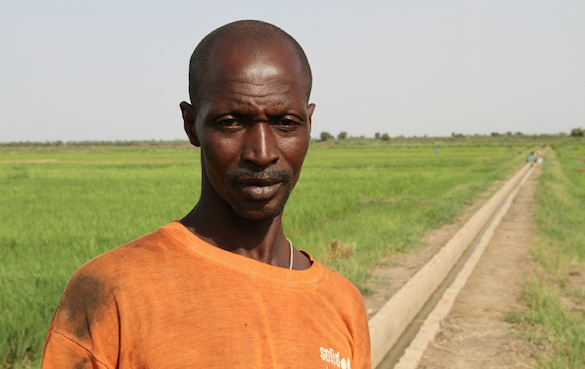Bagui, Mali – Putting food on the table had never been an easy task for Kaadi Tangura. A father of 4, Kaadi worked hard to grow millet on the hills outside his home in the village of Bagui, Mali, in the commune of Korombana. Lacking irrigation and with poor rainfall, Kaadi’s production seldom was greater than 1 ton.
“Most years, low rainfall meant I could only harvest 2 to 3 months worth of grain for my family,” Kaadi said. “It was not enough. To make up the difference, I had to sell our animals just to put food on the table or find temporary work in Bamako or Mopti.”
With the installation of an irrigation system in 2005, farmers like Kaadi were able to make the most out of what little water was available, allowing them to stagger crop irrigation and ultimately increase their yields. From 2007 to 2012, the Tangura family produced enough food to meet its own needs and beyond. Kaadi was able meet all of his household needs and even sell rice at the market. He recouped the animals and equipment he had sold during leaner times.
“We were not rich, but we had everything we needed to improve our conditions,” Kaadi said.
When political crisis struck Mali in 2012, rebels in the north roamed from town to town in search of homes and businesses to loot, vandalizing infrastructure in towns like Bagui. The irrigated perimeter in Bagui was destroyed.
“After so many successful years, we lost everything”, Kaadi said. “I was so discouraged … I considered uprooting my family and moving somewhere safer to start all over again.”
Then, through the support of the United States Agency for International Development/Office for Foreign Disaster Assistance (USAID/OFDA), the Near East Foundation began implementing the Restoring Economic Capacity of Populations Affected by the Crisis in Northern Mali (RECAPE) project. The project addresses the immediate recovery needs of people in northern Mali to restore livelihoods and food security.
The project distributed vouchers for food aid, fertilizers, and seeds to hundreds of households like the Tangura’s and worked with local leaders to repair vandalized infrastructure.
Agricultural activity has resumed, and the local economy is slowly coming back to life. Along with others in his community, Kaadi and his family have begun to recover.
“It is often said that where there is life, there is hope,” Kaadi said. “Thanks to the RECAPE project, I can personally attest that this saying is true. Thank you to all who have contributed to my village’s rebirth and helped us to preserve our dignity. There is so much potential here, in the land and in the water.”
The RECAPE project has restored 5 fishing ponds, provided supplemental feed for more than 100,000 livestock, distributed 7,800 vouchers for seed and fertilizers, restored irrigation on more than 100 hectares (benefiting more than 1,000 people), and distributed $190,000 in livelihood grants to 1,900 individuals.



